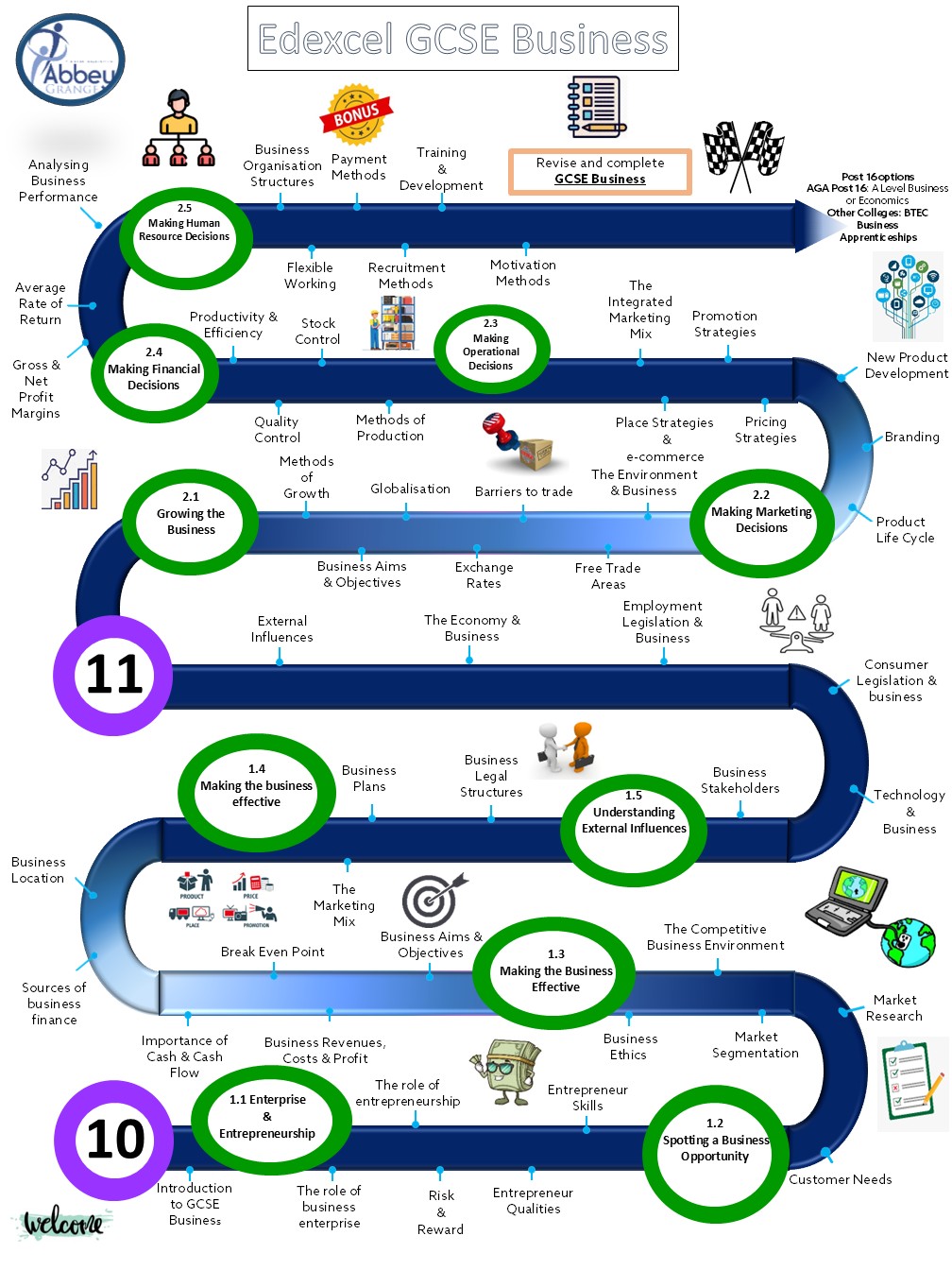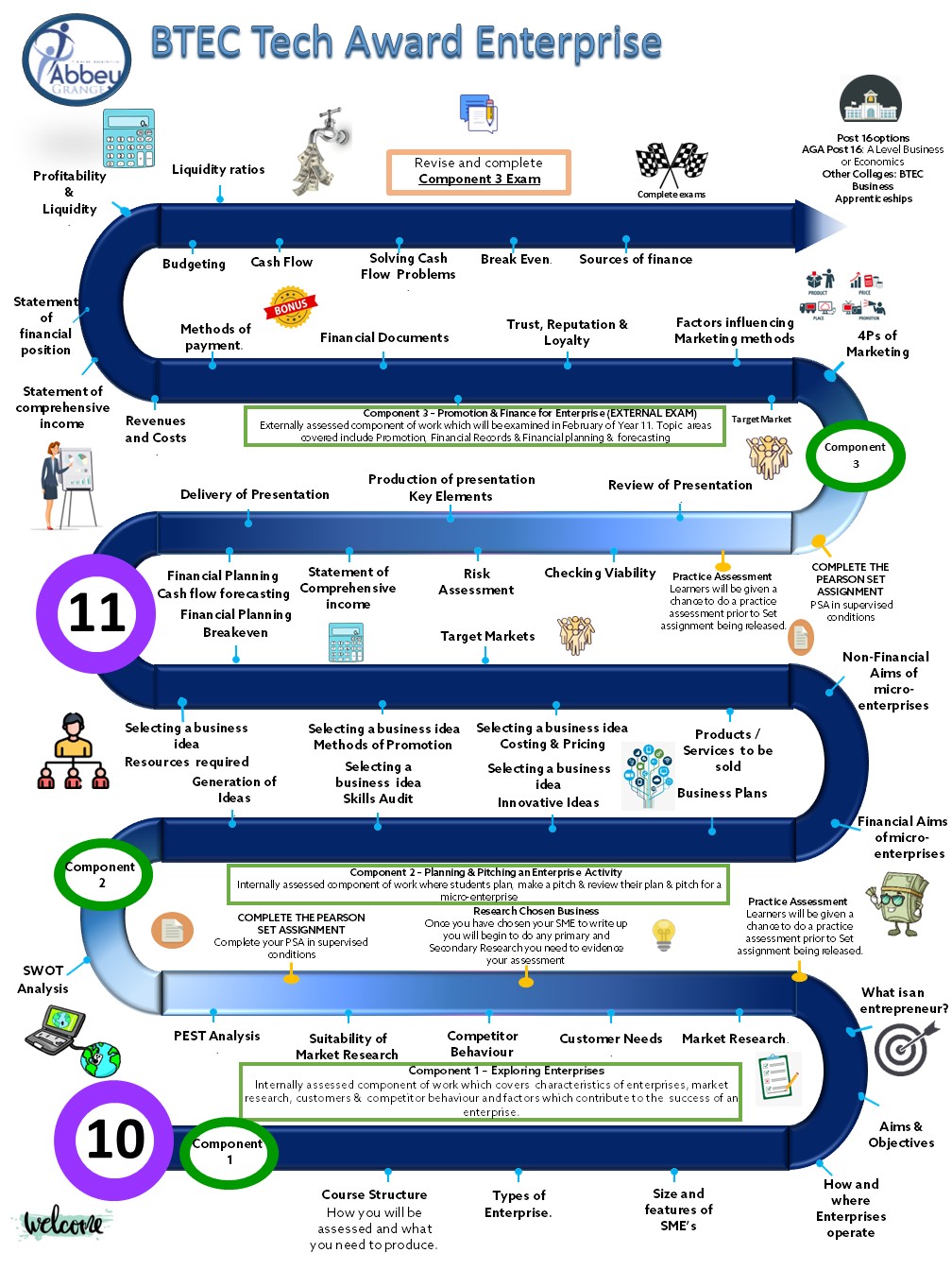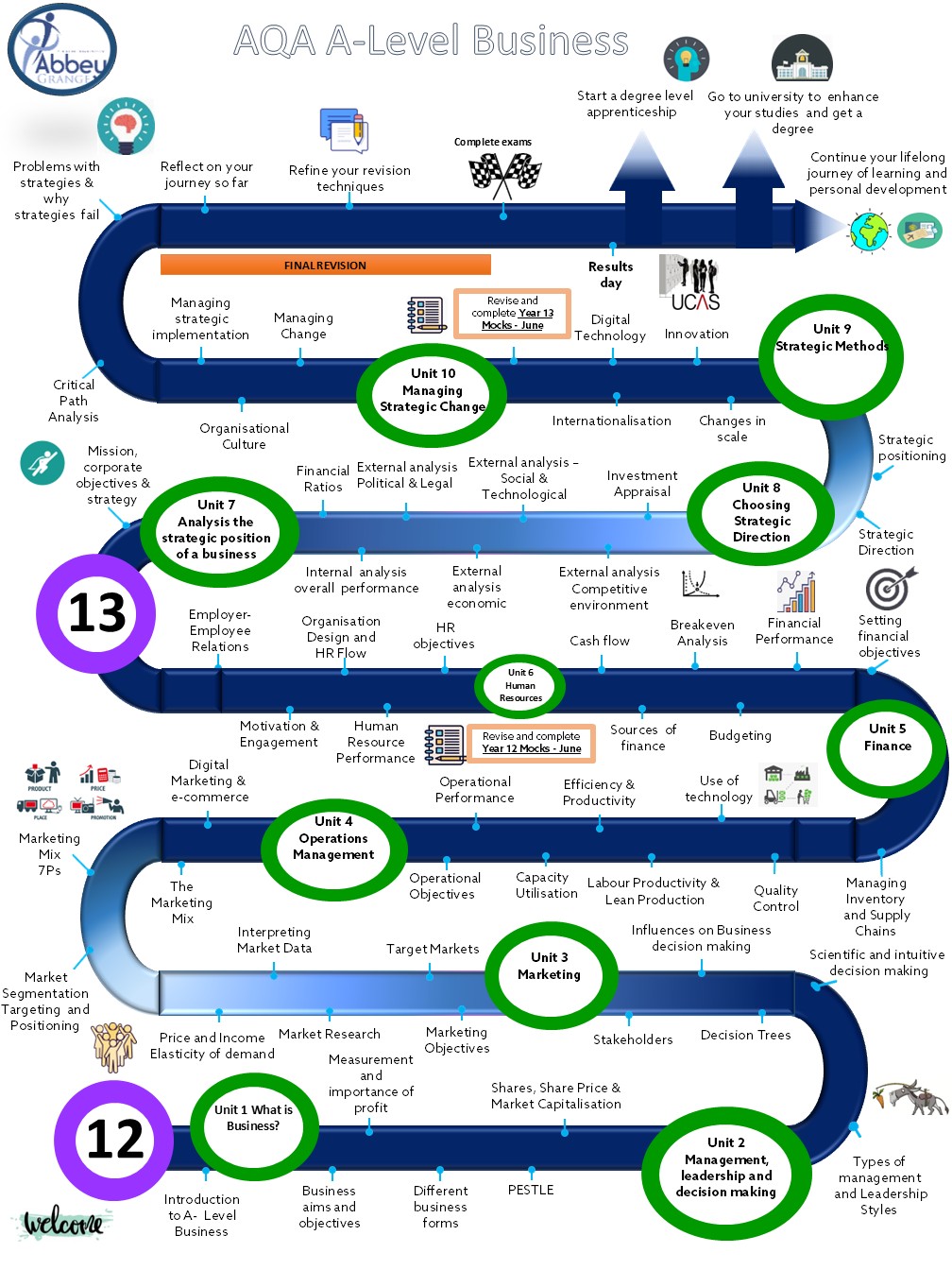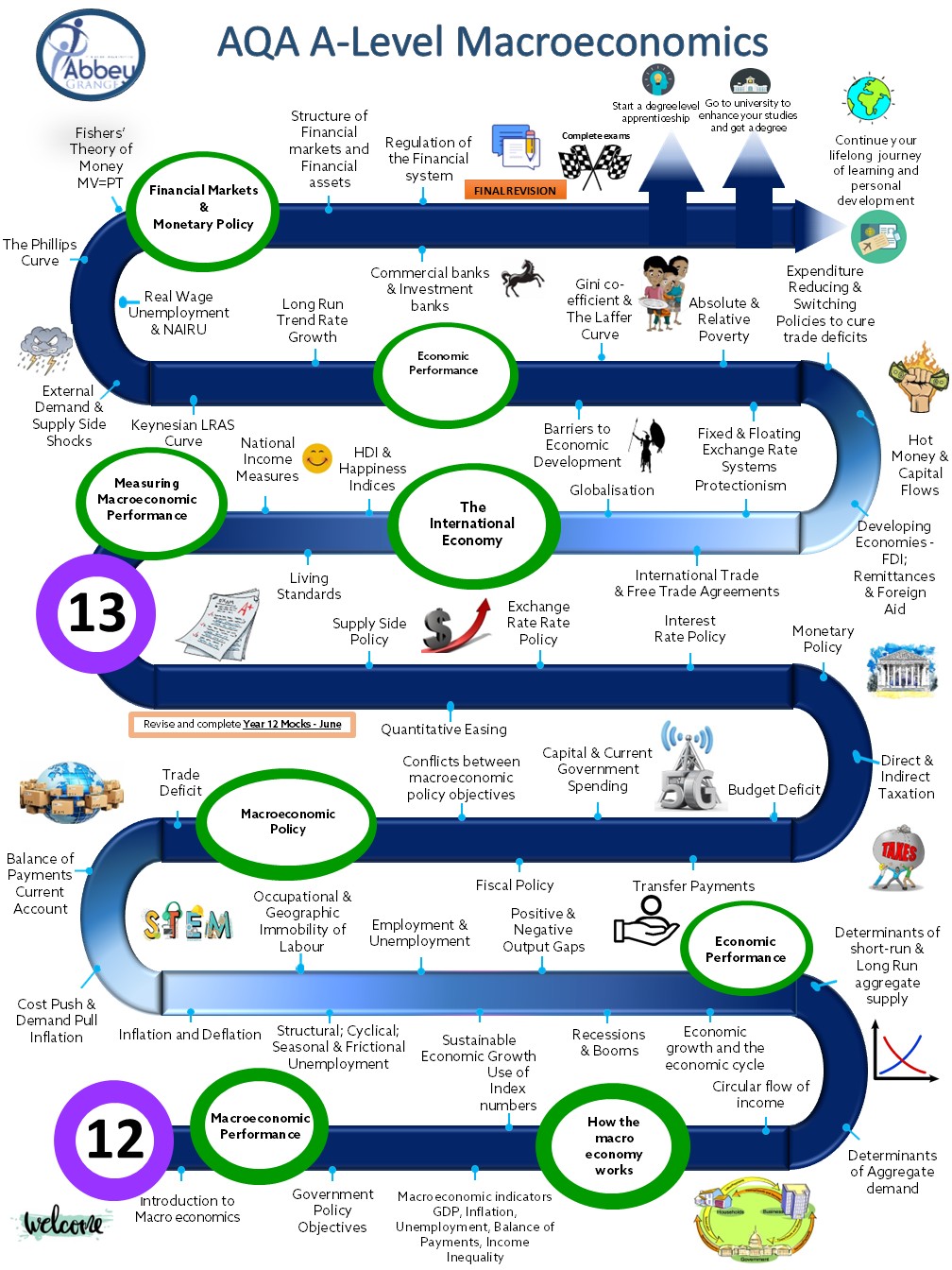
Our Business curriculum aims to educate, nurture and empower the next generation of young entrepreneurs by fostering a culture of aspiration. We aim to foster a passion for excellence in innovation, ethical leadership, and responsible business decision-making whilst empowering our students for success in the global workforce. We nurture our students to believe that they can excel in business and contribute positively to society becoming the responsible, benevolent leaders of tomorrow
Our Economics curriculum aims to educate, nurture and empower students to become forward-thinking and benevolent economists who lead positive change in an ever-changing and sometimes challenging global economy. Through a rigorous and engaging curriculum, we aim to foster a deep understanding of economic principles, encourage critical thinking, and inspire students to use their knowledge to suggest aspirational policy solutions that improve global economic welfare. Our pursuit of excellence drives us to nurture curiosity and cultivate a belief in ethical decision-making that empowers our students to understand and shape the world around them.”

In GCSE Business, students will explore the fundamentals of business, focusing on both starting and growing a business. Students will engage with open-ended questions and classroom dialogue to encourage critical thinking and articulate expression and take part in debates, group discussions, and presentations to develop your speaking and listening skills. Students will engage with business case studies and articles, developing skills to extract key information, analyse data, and make informed decisions. Students will also practice extended written responses, learning to structure their writing effectively and use appropriate business language.
Students will understand the role of entrepreneurs and the importance of innovation. You will identify market gaps and assess business ideas. Students will develop a business plan and consider the resources needed. Students will understand business operations, marketing, and finance and explore factors like economic conditions, legislation, and competition.
Students will understand strategies for expansion and managing increased complexity. You will understand market research, segmentation, and the marketing mix. Students will explore production methods, quality, and efficiency. Students will learn about budgeting, cash flow, and financial statements, recruitment, training, and motivation of employees.
Our Business curriculum aims to educate, nurture and empower the next generation of young entrepreneurs by fostering a culture of aspiration. We aim to foster your passion for excellence in innovation, ethical leadership, and responsible business decision-making whilst empowering you for success in the global workforce. We nurture you to believe that you can excel in business and contribute positively to society becoming the responsible, benevolent leaders of tomorrow.
Students might ask themselves, what motivates me? Is it money, purpose, creativity, or helping others? Do I define success by income, values, or something deeper? What kind of career or role do I see for myself in society?
Students might ask of others, what responsibility do businesses have to employees, customers, and communities? How should we treat people in a workplace or marketplace? Is it right to prioritise profit over people?
Students might ask of Beauty and God, can business create beauty — in design, innovation, or customer experience? What does my faith say about wealth, greed, generosity, and justice? How can I live out my beliefs in a world driven by money and competition?

The BTEC Level 2 Tech Award in Enterprise and Marketing is a vocational qualification designed to provide you with a practical understanding of business concepts, focusing on entrepreneurship, marketing, and enterprise skills. Students will engage in group discussions and debates to encourage you to articulate your ideas clearly, listen to differing viewpoints, and build upon others' contributions. Students will create and deliver presentations or business pitches to convey information persuasively and confidently, mirroring real-world business scenarios where clear communication is essential.
The qualification comprises three components.
Component 1: Exploring Enterprises
Students will learn about the types of enterprises and their purposes, as well as market research and its role in identifying opportunities. You will also understand customer needs and preferences and become familiar with the factors influencing business success.
Component 2: Planning for and Pitching an Enterprise Idea
Students will generate and develop their business ideas and conduct market research to support the business idea. Students will create a business plan and pitch the business idea effectively.
Component 3: Promotion and Finance for Enterprise
Students will learn about marketing strategies and promotional techniques as well as budgeting and financial planning. Students will understand costs, revenue, and profit and be able to evaluate the financial performance of a business.
Our Business curriculum aims to educate, nurture and empower the next generation of young entrepreneurs by fostering a culture of aspiration. We aim to foster your passion for excellence in innovation, ethical leadership, and responsible business decision-making whilst empowering you for success in the global workforce. We nurture you to believe that you can excel in business and contribute positively to society becoming the responsible, benevolent leaders of tomorrow.
Students might ask themselves, what motivates me? Is it money, purpose, creativity, or helping others? Do I define success by income, values, or something deeper? What kind of career or role do I see for myself in society?
Students might ask of others, what responsibility do businesses have to employees, customers, and communities? How should we treat people in a workplace or marketplace? Is it right to prioritise profit over people?
Students might ask of Beauty and God, can business create beauty — in design, innovation, or customer experience? What does my faith say about wealth, greed, generosity, and justice? How can I live out my beliefs in a world driven by money and competition?
The BTEC Level 2 Enterprise and Marketing qualification is assessed through a combination of internal and external assessments taken throughout the duration of the two-year course:
Component 1: Internally assessed through coursework.
Component 2: Internally assessed through a controlled assessment.
Component 3: Externally assessed through a written examination.
Studying BTEC L2 Tech Award in Enterprise & Marketing can open opportunities for you to study L3 BTEC / T Level Business or A Level Business in the sixth form or at college or to take an apprenticeship and earn while you learn in real world business environments such as digital marketing, advertising, and brand management, Accounting, Recruitment and not forgetting of course, setting up your own business.

In A Level Business, students will explore the dynamic world of business through a comprehensive curriculum that covers various aspects of business operations, decision-making, and strategy. Students will engage with open-ended questions and structured discussions to encourage you to articulate your ideas, listen actively, and build upon each other's contributions. Students will take part in formal debates to help you practice articulating your ideas, listening actively, and responding to counterarguments. Students will create and deliver presentations or business pitches to convey information persuasively and confidently, mirroring real-world business scenarios.
Students will engage with complex business case studies, developing skills to extract key information, analyse data, and make informed decisions. Students will also write detailed reports, evaluations, and business plans, helping you to structure your writing effectively and use appropriate business terminology.
The course is structured to provide a deep understanding of business functions and the external factors influencing them.
Students will understand the nature and purpose of business activity, exploring business objectives and stakeholder objectives and identifying business ownership and the role of entrepreneurs. Students will examine different management styles and leadership approaches to understand decision-making processes and their impact on business performance. Students will analyse market research and its role in decision-making, exploring the marketing mix (product, price, place, promotion). Students will also understand segmentation, targeting, and positioning strategies used by businesses.
Students will study production processes and methods and understand capacity utilization and lean production. As well as exploring quality management and stock control methods used by businesses. Students will learn about financial statements and their analysis, understanding budgeting, cash flow, and financial ratios as well as sources of finance and investment appraisal techniques.
Students will learn about recruitment, selection, and training processes. Understanding motivation theories and leadership styles as well as exploring employment law and industrial relations.
Students will assess internal and external factors affecting business strategy. Conducting SWOT and PESTLE analyses as well as evaluating competitive advantage and strategic capabilities. Students will explore strategic options such as growth, mergers, and diversification and become familiar with corporate-level business strategies.
Students will analyse strategic methods such as cost leadership, differentiation, and focus strategies as well as evaluating the role of innovation and technology in strategy. Students will understand the need for change and managing resistance in businesses as well as exploring change management models and their application.
Our Business curriculum aims to educate, nurture and empower the next generation of young entrepreneurs by fostering a culture of aspiration. We aim to foster your passion for excellence in innovation, ethical leadership, and responsible business decision-making whilst empowering you for success in the global workforce. We nurture you to believe that you can excel in business and contribute positively to society becoming the responsible, benevolent leaders of tomorrow.
Students might ask themselves, what kind of leader would I be — autocratic or democratic, profit-driven or people-first? Do I want to build something meaningful, or just make money? How do my values affect the way I make decisions in business or life?
Students might ask of others, should businesses put people before profit — or is profit a way to serve people better? How do we balance the needs of stakeholders: employees, customers, suppliers, communities? Are workers just “resources,” or do they have intrinsic value?
Students might ask of Beauty and God, can a brand or product be “beautiful” — not just in design, but in purpose? How can innovation reflect something deeply human or inspiring? Is it ethical to make a profit from things that harm society or the planet? How do faith and values influence leadership and decision-making?
AQA A Level Business is assessed through three written exams at the end of the two-year course. Each paper is 2 hours long and contributes one-third to your final grade. The assessments include a mix of multiple-choice questions, data response questions, and essays.
Studying A Level Business can open opportunities for you to embark upon university degree studies and apprenticeships in Accountancy, Business Management, Business Analyst & Development, Digital Marketing, HR, Investment Banking & Finance, Project Management and not forgetting of course, setting up your own business.

In A Level Economics, students will study both microeconomics and macroeconomics, exploring how individuals, firms, and governments make decisions and how these decisions affect the economy. Students will take part in formal discussions and debates articulating your opinions, listening to differing viewpoints, and critically evaluating arguments. Students will be asked to prepare presentations on “hot” economic issues and present to the class, conveying information effectively and responding to questions, fostering confidence and clarity in communication. Students will read economic texts critically and be able to articulate your understanding to develop essential communication skills that are crucial for academic success and informed citizenship.
The course is typically divided into microeconomics & macroeconomics, each focusing on different themes:
Students will understand the fundamental economic problem and explore how markets operate and how prices are determined. You will examine different market types like perfect competition and monopoly and identify reasons for market failure and evaluating government response. Students will analyse how firms make production and pricing decisions as well as investigating wage determination and employment issues and exploring the causes and consequences of inequality.
Students will learn about measuring national income, inflation, and unemployment as well as understanding the total demand and supply in an economy. You will explore government spending, taxation, and central bank policies as well as studying the benefits and challenges of global trade. Students will also understand long-term economic progress and development issues in developing and developed economies.
Our Economics curriculum aims to educate, nurture and empower students to become forward-thinking and benevolent economists who lead positive change in an ever-changing and sometimes challenging global economy. Through a rigorous and engaging curriculum, we aim to foster a deep understanding of economic principles, encourage critical thinking, and inspire you to use your knowledge to suggest aspirational policy solutions that improve global economic welfare. Our pursuit of excellence drives us to nurture curiosity and cultivate a belief in ethical decision-making that empowers you to understand and shape the world around you.
Students might ask themselves, what do I value most—wealth, freedom, security, fairness? Would I make different choices if they harmed others but benefited me? Do I believe people are rational decision-makers, or do we act emotionally and morally?
Students might ask of others, how should wealth and resources be shared? – Is inequality acceptable? When is it unjust? Why do poverty and unemployment exist in a world of abundance? Should we always pursue economic growth—even if others suffer in the process?
Students might ask of Beauty and God, can true economic success be measured not by GDP but by joy, community, and meaning? Does my faith (or conscience) shape how I view wealth, poverty, justice, and generosity? Is there a higher moral law that should shape our economies?
AQA Economics is assessed through three written examinations at the end of the two-year course:
Paper 1: Markets and Market Failure
Paper 2: National and International Economy
Paper 3: Economic Principles and Issues
Each paper is 2 hours long and contributes one-third to your final grade. The assessments include a mix of multiple-choice questions, data response questions, and essays.
Studying A Level Economics can open opportunities for you to embark upon university degree studies and apprenticeships in Accountancy, Business Management, Business Analyst & Development, Investment Banking & Finance Analyst, Civil Service Policy Analyst, Actuary, Investment Analyst, Quantity Surveyor and not forgetting of course, becoming an Economist.